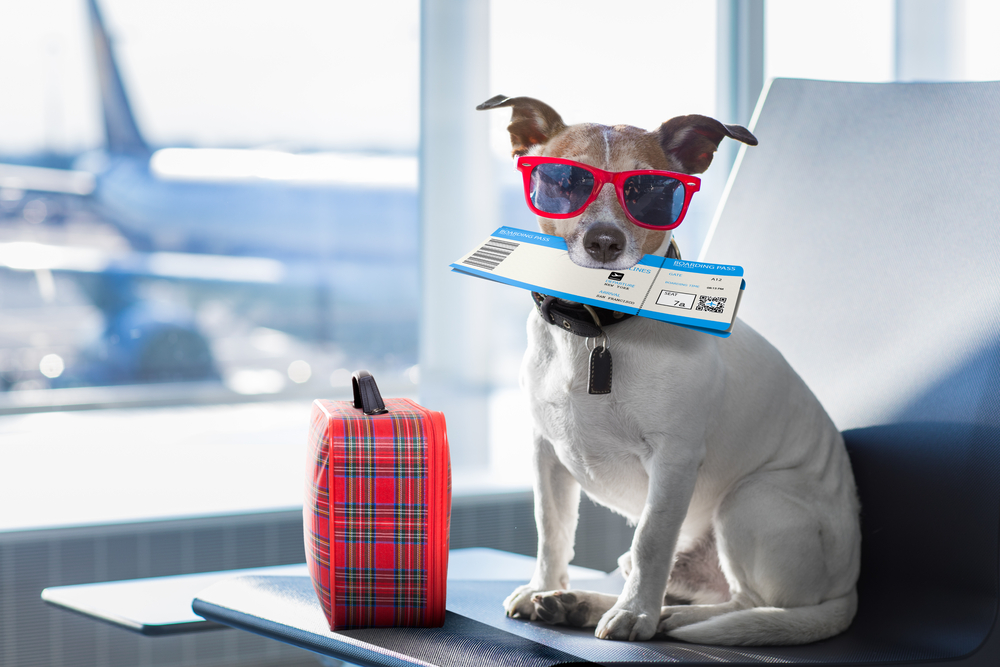Pets have a powerful impact on families because they offer unconditional love. But that impact is significantly amplified in military families and active service members. Pets in the military are popular due to the emotional support they can provide.
For that reason, it’s natural to want to take your pet with you when the military relocates you to a new state or country. It’s even more important to do it as an active service member who deploys overseas a lot and leaves their spouse and kids alone for long periods.
But how does PCSing with pets work, and how much help do you need? Adding a pet to the equation makes every relocation more difficult. That doesn’t mean it’s impossible.
Sort Out the Documentation
There are a couple of things that involve PCSing with pets in the military. Every pet must travel with a rabies vaccine certificate. This applies to domestic and overseas PCSing with cats, dogs, and other pets. You can get the certificate from on-base and off-base vets.
It doesn’t matter what vet you choose, except that an on-base vet clinic might offer discounted services and treatments.
Although this sounds simple enough, it’s not. The age of your pet matters a lot. For example, animals receiving their first rabies vaccine need 28 days before it takes effect. That means you can’t relocate with that pet until the 29th day.
In addition to the rabies vaccine certificate, a 10-day health certificate is necessary when traveling with pets. Keep in mind that not all veterinarians have the authority to issue these certificates. Therefore, it’s best to make an appointment with a Veterinary Corps officer. If you get your orders during the summer, PCSing with Army pets can be difficult.
Summer is the peak season for PCSing, and many on-base vet clinics are busy.
Another document you need is an acclimation letter. Any on-base vet can give you one. The letter states how your pet will travel – cargo or cabin.
These papers cover pretty much everything for PCSing with pets in the military. But not everyone is lucky enough to get a domestic relocation. International moves can have additional requirements you and your pet must satisfy.
When moving overseas with pets, military personnel must research the country of destination. Every country in the world is free to enforce whatever rules and regulations they want for pet travelers. Having a rabies vaccine might only scratch the surface of certifications and paperwork.
For example, some countries may ask for FAVN (Fluorescent Antibody Virus Neutralization) testing for the rabies virus. Others may require specific parasite examinations, proof of treatments against fleas and ticks, and a whole battery of tests. These can take time, especially during a busy PCSing season.
Therefore, taking care of your pet’s travel requirements first and foremost is an excellent thought.
If you want to find out what tests or vaccines your pet needs to travel to any country, the USDA Animal and Plant Health Inspection Service website offers plenty of information.
Train Your Pet
Taking military pets overseas or even to a new domestic military base can be taxing on people and their animals. Not all pets handle long trips well and having a sociable and calm pet will make the relocation less stressful.
Training your pet is a good idea. Of course, you should do this as soon as you get your pet. The longer they have to acclimate to moving crates, the easier it will be when you relocate. Crate training is crucial, especially for Army pets that are more likely to move.
If you have time, you can work with a trainer. If not, taking a few short trips with your pet before relocating is one way to get them accustomed to a specific transport method. Even a couple of rides around town will benefit pets and owners.
In addition, training your pets for PCSing will help you see if they suffer from motion sickness. If that’s the case, your pet may need additional treatments and veterinary care before your relocation.
Locate Pet-Friendly Lodging on Your Route
If you’re PCSing domestically, chances are you might ship your household goods, appliances, personal items, and furniture with experienced military movers. But you and your family might travel by car and take your pet with you.
If the journey is long, you’ll probably need to make a few stops and rest. But not all hotels and motels are friendly to pets. Finding pet-friendly lodging ahead of time is important because you can’t leave pets overnight in your car.
If you’re traveling abroad, pet lodging might also be necessary. Some relocations won’t involve you going directly from the airport or dock to your new home. It’s best to find a place where you can spend one or two nights with your pet. Remember that air travel will inconvenience your pet. Thus, you’ll want to move them quickly to a friendly environment before completing your relocation.
Prepare Appropriately for Travel
If you’re PCSing and carrying your pet by car, you will need extra supplies on hand. Food, water, toys, blankets, a leash, and other items are necessary whether traveling with dogs or cats.
A leash is arguably essential because your pet will need to stretch after a while, the same as you. Therefore, you don’t want to risk your pet running away in a foreign environment.
If driving, consider keeping the heat low in the car. While dogs are quite flexible, cats can easily overheat on long trips in the car, especially in the summer.
Set Money Aside
PCSing with Navy, Air Force, or Army pets isn’t always cheap. You may get some reimbursement from your branch when relocating due to orders. However, the amount won’t always cover all transportation needs, veterinary treatments, documentation, etc.
Moreover, the military might only help you relocate with one pet. But even that’s not a given. If you have more than one pet, you should prepare to support all the costs yourself.
If you anticipate your orders may come through in the immediate future, start planning sooner rather than later. Put money aside for your pet’s expenses, especially when PCSing overseas.
It can cost a lot to get all the paperwork ready, pay for specific treatments, and potentially cover quarantine costs. Owners almost always need to support all costs associated with examinations and quarantine accommodations for their pets.
More Questions Answered
Can You Have Pets in the Military?
While you can’t keep pets in the barracks, there are few restrictions for military personnel living on a base campus or in private homes. A wide range of pets is allowed in military homes, with each base having some latitude for setting specific rules.
Pet owners must be prepared to walk their dogs on leashes at all times or adopt only specific breeds while living on the base. The information you need regarding pet housing on a particular base should be available at the information office.
However, it’s worth noting that many military bases impose a two-pet limit per military household. Therefore, you PCSing with more than two pets can be challenging when relocating to specific bases.
Can You Have Pets in the Air Force?
Any member of the U.S. Air Force can own pets while living on the base. Naturally, owning a pet on the base requires following various rules and regulations. For instance, the Air Force doesn’t allow livestock and swine as pets. Rabbits are also tricky to accommodate but not illegal.
The most important thing to remember is that pet owners are deemed responsible for the actions of their animals on the base. Usually, pets are free to roam around unleashed in the yard or enclosures. But talking them out for a walk around the base requires owners to leash their pets.
These are typical civilian rules regarding pets. Some bases may have special rules about what breeds Airmen can own, how to house them, and how to walk them safely around the base.
Can You Have Pets in the Navy?
Navy installations generally allow up to two dogs or two cats per military base household. In some cases, certain breeds are prohibited from living on base.
Other restrictions could apply to the animal’s size. For example, pets over 70 pounds are unlikely to be welcomed on Navy bases.
Of course, you can’t have pets while going through boot camp, special training, living in the barracks, or serving on a ship. Seamen may also encounter difficulties housing pets at Navy Lodges. Therefore, getting as much information as possible when PCSing with pets in the Navy is important to ensure you won’t get separated from your animal during the relocation.
Does Military Pay to Ship Pets?
Pet owners serving in the military get substantial help when PCSing domestically and internationally. Unfortunately, the reimbursement only assists with shipping costs and sometimes spouse and family relocations. You will not receive military pet travel reimbursement.
When a military family has pets, PCSing costs hundreds if not thousands of dollars more than normal due to the technical and logistical difficulties of moving pets. The military does very little to accommodate those who serve with pets in the military.
Usually, no military branch covers pet PCSing, not even partially. Of course, there could be exceptions regarding rank, the importance of an officer, etc. But no military branch has an obligation to assist with pet PCSing.
What does this mean for military families?
When moving overseas with pets, military channels are unlikely to assist. But they do offer military animal shelters for Army pets, Navy pets, and Air Force pets. They’re often located close to the bases.
The shelters can help provide temporary lodging for animals until their owners can retrieve or return home. It’s not much, but it’s something.
Luckily, military families can go outside the military for assistance. The Society for the Prevention of Cruelty to Animals (SPCA) responded to this common PCSing problem. The SPCA founded Operation Military Pets.
It’s a platform designed to offer financial assistance to military families during a PCS. The financial help is provided in the form of grants and is available for domestic and international military relocations.
Many families have started applying for grants due to the high costs of moving with pets, especially following short-notice orders.
Even better, all families from military branches qualify for these grants, meaning any family can get the financial aid it needs to keep all its members together.
Remember that SPCA is a non-profit organization and has limited funds. Therefore, its potential to help you during a move depends on your expenses, how many donations it received, etc. In some situations, you may still need temporary lodging for your pets before you can relocate them. If you want to apply for a grant, it’s best to do it as soon as you get your PCS orders.
Don’t Be Afraid to Ask for Help
Unexpected PCS orders rarely impact military families or single active service members positively. Moving requires planning, has complex logistics (especially during international relocations), and it costs money. And when that move involves a pet, the costs can skyrocket.
Fortunately, the military offers some financial aid to cover shipping costs, and moving costs, and may even assist with spouse relocations. It can alleviate some financial stress. With more money to work with, you should have an easier time paying for moving your pets from your current home to the new base. But depending on how far away you must move, you might still face a difficult process.
Take care of all the documentation, examinations, and treatments as soon as possible to avoid pet restrictions. This is crucial for international PCSing. Pets without the proper paperwork can end up in quarantine, returned home, or worse.
Some organizations outside the military, like SPCA International, can offer guidance and financial assistance. In addition, it’s best to find an experienced moving company. Even if you can’t ship your pets with movers, they can take care of the logistics involved in moving furniture, household goods, temporary storage, and everything else.
With a cleaner plate, you can better manage your pets’ relocation.
If you feel that PCS orders are imminent, contact us at 866-226-1441 or get a no-obligation quote online. At Military Movers, we specialize in domestic and foreign PCSing for families in all military branches.








